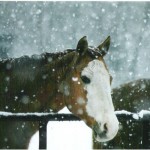 Winter is here, there is no denying it! With so many more challenges presenting themselves in the winter we do have to work harder and smarter to keep our horses healthy once the temperatures drop. Here are some tips to keeping your horse fit and healthy during the cold winter months.
Winter is here, there is no denying it! With so many more challenges presenting themselves in the winter we do have to work harder and smarter to keep our horses healthy once the temperatures drop. Here are some tips to keeping your horse fit and healthy during the cold winter months.
1. The fact of the matter is we don’t ride as much during the winter months which can dramatically alter the amount of calories a horse needs to consume. With your horse standing around the paddock or barn he is burning less calories, but then again, your horse will need to burn more calories to generate body heat and maintain its normal core temperature. Helping your horse maintain his body temperature is important. You can achieve this by substituting two pounds of hay for each reduced pound of grain fed daily. Back in the day, horse owners would corn feed during the winter. They felt it would help generate heat and reduce the amount of stress on the horse in cold weather. What we now know is this; a horse that is eating hay is able to generate more heat in the hindgut from the fermentation of grass and hay thus helping to maintain its body temperature. In all but the most extreme weather, a horse’s caloric needs generally rise only ten to twenty percent.
2. Supplement your horse’s diet with a specialty feed and/or supplements to ensure that your horse receives the necessary amount of minerals and vitamins. Salt blocks and mineral licks should be made available to them as well.
3. Water is the most important nutrient for your horse. During the cold months horses are more susceptible to impaction colic. This is when the intestine becomes blocked by a firm mass of food. Impactions most commonly occur in the large intestine at one of the flexures and can be caused by a reduction in water consumption. Water is essential for a horse to maintain a healthy digestive system. Making sure your horse has good access to warm water will help to prevent impaction colic. When a horse drinks cold water, they must use extra energy to replace the heat lost to the chilling water, therefore, drinking less. The use of a tank heater will encourage your horse to drink more and as an added bonus, you won’t have to break up a layer of ice each morning!
4. Maintaining hoof health though the winter is important as mud and manure pack the hooves and provide an ideal environment for thrush to grow. Pick your horse’s feet often and once a week apply an anti thrush product as a preventive measure. You can make your own anti-thrush solution by mixing one part bleach to two parts water. Whether you use your own solution or a thrush product such as Kopertox, be sure to avoid your skin and your horse’s skin as it will burn. Horse’s hooves still grow during the winter so you do need to have them trimmed on a regular basis. There are many products on the market such as Life Data Farrier’s Formula or Shoer’s Friend (to name a few) that promotes healthy hooves. Keeping your horse’s feet in good condition, free of breaks and cracks will eliminate hoof problems and have your horse sound and ready for shoes in the spring.
5. Blanket your horse in extreme conditions or if you have a show horse with abnormally short winter hair. Be proactive and make sure the blanket still fits your horse and is in good condition.
6. Maintaining good skin care is also important to your horse’s health. Bacteria and fungi can result from your horse having a dirty haircoat. Keep your horse’s skin healthy by currying his body often. Not only will this lift dirt to the surface, it will enable you to feel any hidden bumps or sores that could indicate a wound or skin condition.
7. Should you ride your horse in the winter? You Betcha! There are plenty of nice winter days. Slide some toe warmers in your boots, add gloves, good winter riding wear and get out and ride. If you don’t normally wear chaps/chinks in the summer add them to your winter wear. They are excellent for keeping you warm. Not only is riding through the winter good for your horse’s mental health, it will do wonders for you too.
8. If you use a tail-bag on your horse, it is important to change the bag every 14 days. Rinse, condition, and dry the tail before rebagging. This will help to keep the hair from breaking at the top of the tail.
9. Having a senior horse presents its own set of winter challenges. Talk to your veterinarian about arthritis and joint compounds, as well as, supplements to help them through the cold months. Your senior horse should be monitored often to make sure they maintain their weight and health.
10. If you turn your horses out to pasture in the winter, it is a good idea to have a place where they can get out of the elements. A run-in shed is a good solution when you don’t have a barn. The important thing is to not turn your horses out and forget about them. Monitor their health, have a visual inspection every day at feeding and give them a little extra TLC.
Enjoy the beautiful winter months with your horse…Live, Love, and Ride Often…
Shop at Horse.com for Supplements and Get $5.99 Flat Shipping!